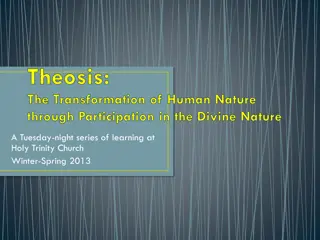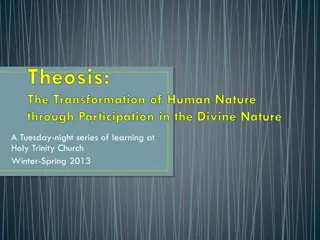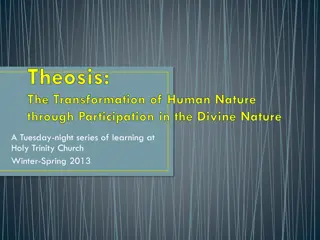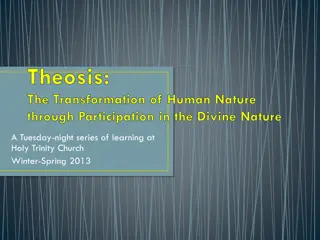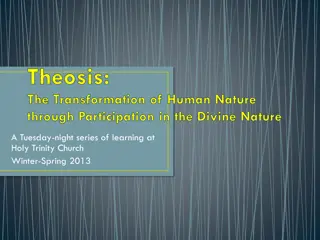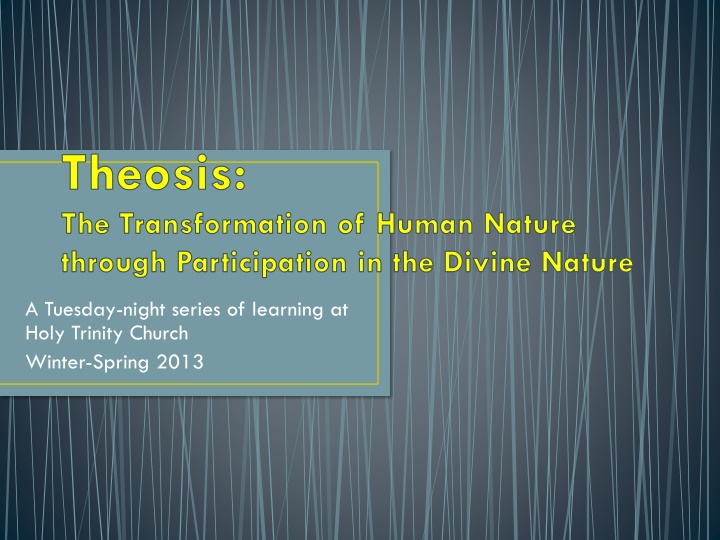
Transformation Through Theosis: Biblical Foundations and Questions Answered
Explore the concept of theosis, the transformation of human nature through participation in the divine, rooted in Biblical foundations from Genesis to 2 Peter. Discover if this concept is pagan or Christian, its presence in the Old and New Testaments, and how one achieves deification. Join the discussion on how the doctrine manifests in church worship and expressions of faith, and what theosis means for us today.
Uploaded on | 1 Views
Download Presentation

Please find below an Image/Link to download the presentation.
The content on the website is provided AS IS for your information and personal use only. It may not be sold, licensed, or shared on other websites without obtaining consent from the author. If you encounter any issues during the download, it is possible that the publisher has removed the file from their server.
You are allowed to download the files provided on this website for personal or commercial use, subject to the condition that they are used lawfully. All files are the property of their respective owners.
The content on the website is provided AS IS for your information and personal use only. It may not be sold, licensed, or shared on other websites without obtaining consent from the author.
E N D
Presentation Transcript
Theosis: The Transformation of Human Nature through Participation in the Divine Nature A Tuesday-night series of learning at Holy Trinity Church Winter-Spring 2013
Some Basic Questions Is theosis a pagan or a Christian concept? Is it found in the Old and New Testaments of the Christian Bible? How did the Fathers of the Church develop this doctrine? How does the doctrine manifest itself in the church s worship and expressions of faith? How does one attain to theosis/deification? What does it mean for us today?
Biblical Foundations Genesis 1:26-27 Then God said, Let us make man ( adam) in our image, after our likeness So God created man in his own image, in the image of God he created him; male and female he created them. Genesis 3:5 But the serpent said to the woman, You will not die. For God knows that when you eat of it your eyes will be opened, and you will be like God (or gods, elohim), knowing (or, knowers of) good and evil.
Biblical Foundations Exodus 7:1 The Lord said to Moses, See, I have made you like God to Pharaoh, and your brother Aaron shall be your prophet. Psalm 82:1, 6-7 God has taken his place in the divine council; in the midst of the gods ( elohim) he holds judgment I say, You are gods, sons of the Most High, all of you; nevertheless, you shall die like men, and fall like any prince. John 10:34-35 Jesus answered them, Is it not written in your law, I said, you are gods ( ) ?
Biblical Foundations 2 Corinthians 3:18 And we all, with uncovered face, beholding the glory of the Lord as (though reflected) in a mirror, are being transformed into the same image from one degree of glory to another. 1 John 3:2-3 Beloved, we are God s children now; it does not yet appear what we shall be, but we know that when he appears we shall be like him, for we shall see him as he is. And every one who thus hopes in him purifies himself as he is pure.
Biblical Foundations 2 Peter 1:3-4 His divine power has given us everything needed for life and godliness, through the knowledge of him who called us by his own glory and goodness. Thus he has given us, through these things, his precious and very great promises, so that through them you may escape from the corruption that is in the world because of lust, and may become participants of the divine nature ( ).
The Alexandrian Tradition Continued Athanasius of Alexandria: The Theological Usefulness of Deification Justin Martyr invoked the Christian concept of deification in responding to Jewish and pagan misunderstandings. Irenaeus invoked deification in his polemics against Gnostics. Clement used it in relating his faith to the Gnostic/Hellenistic context of the Alexandrian church. Origen was less concerned with polemics and more with interpreting Scripture and drawing out the full meaning of biblical statements that hinted at deification. Athanasius (295-373), Nicene bishop of Alexandria, reverted to a polemical paradigm.
Alexandria Under Bishop Rule Clement, and Origen were essentially independent teachers. For Origen, spiritual authority lay in those who showed virtue and philosophical insight. This, in his view, was not always the case with the Alexandrian bishops. It was inevitable that sooner or later tension would arise between the bishop presiding over the eucharistic community on the one hand, and the charismatic teacher surrounded by his pupils on the other. Bishop Demetrius complained that it was unheard of that laymen should preach in the presence of bishops. Demetrius found opportunity to banish Origen from Egypt. This action gave notice that henceforth the intellectual life of the Church of Alexandria would be subject to episcopal control. (Norman Russell, The Doctrine of Deification in the Greek Patristic Tradition, Page 164)
Alexandria Under Bishop Rule Tensions between charismatic teachers and bishops continued in the Alexandrian church right into the Arian crisis of the 4th century, when Athanasius was the most prominent occupant of the episcopal throne in Alexandria. He experienced banishment three times under the Christian emperors Constantine and Constantius II, and it was during those periods that he produced most of his thoughts on deification, in the treatises, Contra Gentes De Incarnatione, the Orations Against the Arians, and the First Epistle to Serapion. It is interesting that deification does not figure in pastoral works like his Festal Letters, or in any of the works of a spiritual nature, such as the Life of Antony. It appears that deification was primarily a theological tool/weapon in the hands of Athanasius.
Athanasius Unlike Origen, Athanasius very rarely refers to human beings as gods . In comparison with Clement and Origen, he narrowed the range of deification vocabulary and went further than his predecessors in distinguishing between pagan deification and its Christian counterpart. Athanasius first use of in a Christian theological context is in the famous statement in De Incarnatione 54: he became human that we might become divine ( , ), a more concise statement of Irenaeus exchange formula. Like Irenaeus, Athanasius saw salvation as a reorientation of fallen humanity towards the divine.
Athanasius If the Old Testament makes mention of Moses and others as sons and gods (cf. Exod. 7:1; Ps. 82:1), that implies that the true Son and God in whom they participate must have pre-existed them. For how can there be deification apart from the Logos, and before him? ( , ) That certain human beings had been deified in the past is taken for granted. For deification itself was not a point of contention with the Arians, since they held Christ himself to have been deified. Athanasius therefore uses deification to prove the existence of the deifying power, and consequently the full divinity, of the Son.
Athanasius In his Discourses Against the Arians, Athanasius rejected the Arian contention that the Son is himself a participant in divinity and therefore deified. Philippians 2: 9 10 ( therefore God also highly exalted him and gave him the name that is above every name, that at the name of Jesus every knee should bend ) was a favorite Arian text, but Athanasius countered that it does not imply that the Son himself was promoted. He was not man and then became God, but he was God and then became man, and that to deify us ( ).
Athanasius was careful to explain in what sense God exalted the Son and bestowed the name of Jesus on him (Phil. 2:9). The Word was not diminished in receiving a body, but rather he deified that which he put on, and moreover bestowed it freely on the human race. It was the human body that was exalted, and we share in the deified flesh which he put on, for it was our own fallen flesh. We are redeemed from sin, raised from the dead, and exalted to heaven. What is bestowed on the Son only touches his humanity, and is the exaltation and grace which he himself gives to believers. This exaltation of human nature in Christ is its deification. The created body of Christ was prepared that in him we might be capable of being renewed and deified. (CA 1.42 et seq)
The body . . . seems to represent for Athanasius what most immediately belongs to humanity, as its own, and thus what is primarily to be transcended. The soul is not conceived in the same way as that which is to be transcended not because it is naturally superior to the body or more divine , but simply because the soul is supposed to be the organ which actually effects this self-transcendence. In other words, the soul is conceived more as the subject of self-transcendence and the body as what has to be transcended. Moreover . . . the body is not the object of this self-transcendence because it is evil, but precisely because it is what is closest to humanity it seems that for Athanasius the selfness of being human resides particularly in the body. (Khaled Anatolios, Athanasius: The Coherence of His Thought, p. 64)
The incarnate Word took our nature into himself in order to save it. Athanasius understood redemption as taking place within the mediatorial life and person of the Incarnate Son. Just as he thought of the Logos as internal to the being of God, so he thinks of our salvation as taking place in the inner relations of the Mediator ( ), and not simply in Christ s external relations with sinners (Torrance). Or, our whole salvation and deification are rooted in our human condition s being ascribed to the Word, for that is what essentially constitutes our own being Worded (Anatolios). Human nature becomes the Word s own so that we are somehow incorporated into the incarnate Word and benefit from the giving and receiving , the exchange of attributes, between God and created humans.
In Contra Arianos 2.70, Athanasius explains how the new creation could not have been brought about if Christ had been a creature. The Logos assumed a created human body that having renewed it as its creator, he might deify it in himself, and thus might bring us all into the kingdom of heaven in his likeness. For man would not have been deified if he had been united with a creature, nor would man have been brought into the Father s presence unless he who had put on the body had been God s natural and true Word. And just as we would not have been delivered from sin and the curse, if it had not been natural flesh which the Word put on (for we would have had nothing in common), so also man would not have been deified unless the Word who became flesh had been by nature from the Father.
Key idea: Solidarity of the human race. The humanity that is deified is both the body of Christ and the human race. Solidarity of the whole human race with the body which the Logos assumed. Athanasius moves easily from the deification of a body to the deification of humanity as a whole. The renewal of the human race is like a second creation carried out by the Creator, but this time from within. The unity of humankind, which Athanasius takes for granted, means that the whole of human nature is deified in principle when the human nature which the Logos assumed is deified by him. The deification of humanity in principle, however, still leaves salvation to be appropriated by individuals.
What is this advance that is spoken of other than the deification and grace ( ) imparted by Wisdom to men, the sin and corruption that is in them having been obliterated according to their likeness to the flesh of the Word and their kinship with it? (CA 3.53) We are deified by receiving the Spirit in baptism. But we do not cease to be human any more than the Word ceases to be divine by assuming a human body. Christ in his incarnation deifies a human body, and makes available the Spirit, who in turn deifies believers, though without obliterating their humanity. (De Decr 14) On the ontological level we are united to the Logos; on the moral level we become like God through imitation and progress in virtue.
Two moments of deification (Russell) in Athanasius: The first is the deification of the flesh by the Logos in the Incarnation: the Logos deified that which he put on; he made the body immortal; he renewed and exalted human nature. The second is the deification of human beings by the Son. In the Incarnation we were assumed by the Logos through his flesh, for the flesh is a generic reality in which all humans share. But the deification has to be appropriated by individual believers. In baptism the Son is encountered as the deifying and enlightening power of the Father. The Spirit comes to dwell within and enables us to receive the deifying body of the Word.
The Life of Antony (c. 356-62) The Life of Antony is Athanasius portrait of a biblically formed holy man whom he considered a model of ascetic discipline and evangelical perfection. Antony is a man in whom we might expect to observe the experiential effects of deification. Yet Athanasius never calls him theopoioumenos, but theophoroumenos. Antony s participation in the divine nature is described in purely ethical terms, in his moral perfection, his humility, his graciousness, and the unperturbedness of his soul reflected in the joyful expression of his countenance. After twenty years of solitude, he emerged from his hermitage initiated into the mysteries and inspired by God (V. Ant. 14).
Sacramental Character of Deification The terminology he uses to refer to the communication of divine life by the Logos, first to the flesh which he assumed and then to all believers who unite themselves to him, points to an essential feature of the deification of the believer in Athanasius, namely, its sacramental character. What is often described as physical redemption is actually transmitted sacramentally. The synonyms for deification which Athanasius uses adoption, renewal, salvation, sanctification, grace, illumination, and vivification all refer to the effects of baptism. Eucharist = participation in the deified flesh of the Logos.
What about the Cross? By fashioning for himself a temple (naos) from the body of the Virgin and appropriating it for his own as an instrument (organon), the Word was able to recreate human nature in the divine image and then offer this restored humanity to the Father through his sacrifice on the cross, with benefits that accrued to the entire human race, for we all die in him. The Word came to dwell among us in order to redeem the human race, and the Word became flesh in order to sanctify them and deify them ( ) (CA 3.39). If the flesh was deified through the Incarnation, its deification was reaffirmed through the Resurrection: For now the flesh had arisen and put off its mortality and been deified.
What about the Cross? The cross and resurrection were indispensable to the doctrine of deification: the Word was made flesh in order to offer up this body for all and that we, partaking of his Spirit, might be deified, a gift which we could not otherwise have gained than by his clothing himself in our created body. (De Decr. 14) Athanasius placed little emphasis on the soul. The flesh of Christ is the organon with which the Logos brings about salvation: salvation comes through the embodied life. This physical emphasis was perhaps required as an antidote to the intellectualism of Origen, but it needed the refinement and completion which Cyril of Alexandria brought to it.
COMING UP NEXT The Cappadocians (Basil and the two Gregorys) Cyril of Alexandria The Areopagite and Maximus the Confessor Symeon the New Theologian, Gregory Palamas & Nicholas Cavasilas The Modern Synthesis

